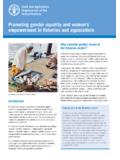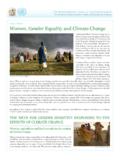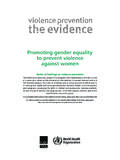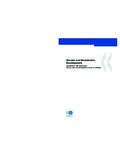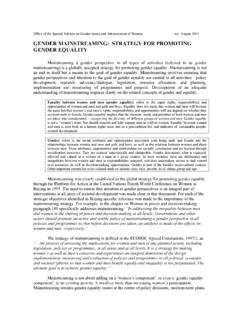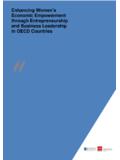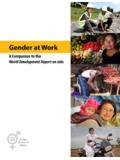Transcription of ANC Gender Paper Policy Doc
1 Gender Paper . Policy DISCUSSION DOCUMENT. The mobilization of women is the task, not only of women alone, or of men alone, but of all of us, men and women alike, comrades in the struggle. The mobilization of the people into active resistance and struggle for liberation demands the energies of women no less than that of men. A system based on the exploitation of man by man can in no way avoid the exploitation of women by the male member of society. There is no way in which women in general can liberate themselves without fighting to end the exploitation of man by man, both as a concept and as a social system.
2 O. R. Tambo 14 September 1981. March 2012. 1. A. INTRODUCTION. 1. This document is informed by the struggles of women in the fight against colonialism and apartheid which were also encapsulated in the women 's Charter of 1954. The discussion is also premised on the charter that women drew up in 1993, prior to the 1994 elections. Our Constitution, in its quest to protect and promote Gender equality in South Africa, drew largely from these documents. 2. Gender is a socially constructed understanding of what it is to be a man and what it is to be a woman.
3 It is the socially imposed divisions between the sexes. It refers to the psychological and physical attributes which a given culture expects to coincide with physical maleness or femaleness. women and men are created by society . Thus it is observable that the deliberate social division of the sexes is deeply embedded in our consciousness; as a result it influences the way in which societies are organised in terms of men's roles . and women 's roles in the family, the economy and in society. Generally, these roles are not biologically determined apart from pregnancy and childbirth, but are culturally allocated (Ginwala, 1991:63).
4 As a result the relationship between these two socially constructed roles is not one of equality. 3. During negotiations for a democratic South Africa in the early 1990s, significant milestones were achieved in respect of ensuring that every South African citizen (male or female) enjoyed their human rights as spelt out in the Bill of Rights. Developments were particularly significant for women , the majority of whom were not only disadvantaged as blacks, but as women in general. Until 1994 many women experienced discrimination spelt out in law.
5 4. The country has also ratified a number of international and regional instruments that promote Gender equality, including the 1979 Convention on the Elimination of All Forms of Discrimination against women (ratified 1995), the 1993 Declaration on the Elimination of Violence Against women (signed 1996), the 1995 Beijing Declaration and Platform for Action and the Optional Protocol to CEDAW, ratified in 2005, and the AU Heads of States Solemn Declaration of Gender Equality in Africa (adopted in 2004)
6 The ratification of the SADC Protocol on Gender and Development which was signed by the President in 2008 must be fast tracked. South Africa is bound by international, regional and sub-regional laws ratified and must take all necessary steps to protect women from discrimination and abuse in all spheres. 5. The intention of this Paper is to re-examine progress made by the ANC. towards its commitment to a non-sexist society, within the organization and in its stated transformation agenda as well as its role in influencing Gender based practices in the continent.
7 The Paper identifies shortcomings and proposes recommendations that would ensure that issues of Gender equality are embedded within the policies of the ANC and that they are articulated in the programmes of a democratic government. 2. 6. The ANC constitution articulates non sexist policies that have indeed influenced the current Constitution of a free and democratic South Africa. Accordingly the ANC constitution and the country's Constitution (1996), recognize women as equal citizens, with equal rights and responsibilities.
8 Furthermore, the ANC has been at the forefront of women 's struggles, by putting forward a vision for a non-sexist society, and institutionalizing Gender equality and women 's empowerment through its policies, its institutional arrangements and intervention measures. 7. The emancipation of women remains a cardinal goal and an anchor for a free and democratic country. This conviction is beyond rhetoric. The ANC continues its endeavours to unite all South African women notwithstanding their different experiences arising from race, class, ethnicity, religion and the country's demographics.
9 Given the legacy of women 's oppression in general and black women in particular, the ANC bias towards working class and rural poor women remains steadfast. 8. In all these endeavors, women 's movements and formations have been central. These straddle from the Federation of South African women , the National women 's Coalition and the ANC women 's League (ANCWL), which played a central role during the apartheid and post apartheid eras to secure a Gender -inclusive democracy and to create new institutions to measure such inclusivity.
10 9. The ANC women 's League has been a critical pillar within the Party to raise awareness, sustain and carry forward women 's empowerment and advocate a Gender equality formation of the Progressive women 's Movement in 2006 in Mangaung, involving a broad range of women 's organisations from different parts of the country, was an encouraging new development. Similarly with its strong Gender focused civil society including researchers, grassroots organisations and feminist intellectuals who have contributed to advocate and continue to influence Policy developments biased towards women , South Africa has moved from strength to strength towards the total emancipation of women .
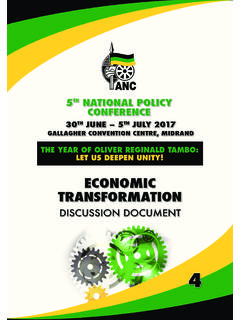
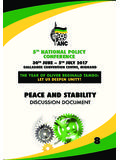
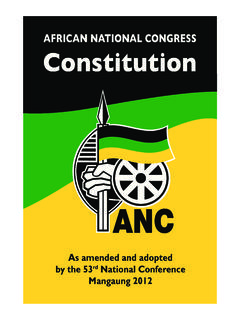
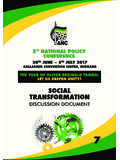
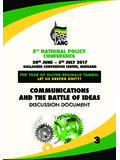
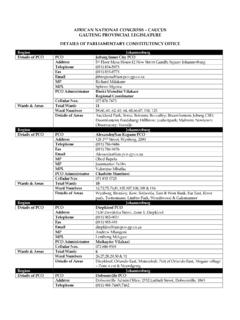
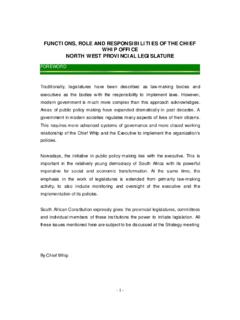
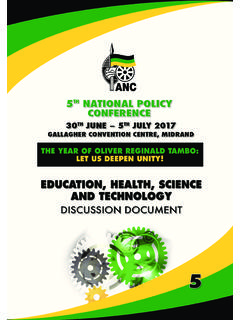
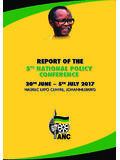
![cf[Ub]gUh]cbUD - African National Congress | …](/cache/preview/9/b/c/f/b/b/d/7/thumb-9bcfbbd7dbc1e55d8d2e399233c83404.jpg)
